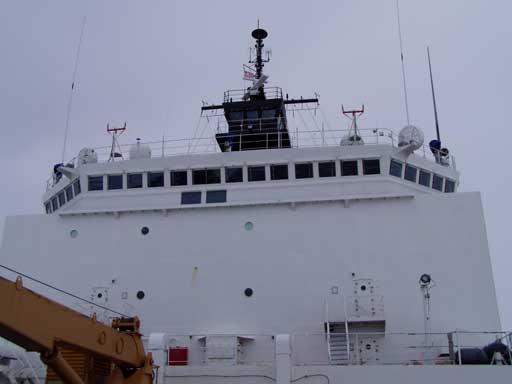( Log In ) Log In is for TREC Teachers & Researchers only
  |
| Steve_Marshall |
 Jun 15 2005, 04:34 PM Jun 15 2005, 04:34 PM
Post
#1
|
 TREC Teacher    Group: TREC Team Posts: 78 Joined: 27-April 05 Member No.: 12 |
Note: Our Access to the internet is limited, so I just wanted to get this journal entry in quickly so you can at least read it. If I don't get the pictures in this session, check back at 8pm Alaska time, and hopefully they will be there--Steve
June 13, 2005 #2 Living and Working on the Healy  Here's a picture of the Helicopter on the Deck of the Healy WE MADE IT!! Just Like Home?  Here's a shot of the bunks in the stateroom Not Too Bad for Being on a Ship  This is a picture of the working area we had in our staterooms...It has a view too Smooth Sailing  Picture out the porthole just after boarding the ship Not-So-Smooth Sailing  Same Porthole, Different Time--Ice, Ice Everywhere, and not a snowball to throw Having a decent size room for so many should give you an idea of the size of the ship…It’s huge! It’s about 420 feet long, and while that might not seem like much, when you consider all the levels it has, it’s definitely something you could get lost on. After settling in our rooms, we were given a short tour of the ship, and I knew it was going to take lots of practice to remember where everything was. I at least knew how to get to the most important places right away: My room and the messdeck (where we eat). That's A Lot of Windows!  A Picture From the Bow of the Ship Looking Up at the Bridge Exploring the Ship on My Own After getting a little more comfortable finding my way around the ship, I quickly found some of my favorite spots were outside watching the ship break through the ice. It was amazing to see such huge, thick blocks of ice be broken apart like a knife through butter. Don’t get me wrong, you could definitely feel the motion an hear the engines work harder as we broke through the ice, and in thicker spots we actually had to back up and push through again, but for the most part, the ship moved through a lot easier and smoother than I would have ever expected. I Think I Can, I Think I Can  To get an idea of size, the edge of these ice blocks are probably about 5 feet or more thick Still Chrunching Away  One More View  I even had more pictures of the ice...Can you tell I'm fascinated with the ice-breaking process?? Dinner on Board After a little exploring, we had our first dinner on the ship. We had a surprising number of choices, and while the quality may be only a little less, it reminded me of a typical buffet at a restaurant. We’ll have to see if that lasts, though. Since the ship has to bring all the food on board, and there’s not a grocery store around the next corner when you’re in the Arctic Ocean, you have what you have, and I’ve heard towards the end of a cruise, the variety and quantity of food decreases noticeably. Checking Out the Workspaces Since we had gotten on the ship so late, there wasn’t a lot to do work-wise yet except set a few things up. We did go down to the computer lab to see where the sonar data was collected. This was an amazing lab that had monitors for single beam sonar, multibeam sonar, and other data collection. It also had monitors that showed camera shots of the bow and stern of the boat so you could see what was coming up. That’s one thing I noticed—monitors showing the outside are all over the ship, so you don’t have to go far to see what it’s like outside. Monitoring the Progress  This is a little hard to see, but it shows the information from multiple sonar beams...This allows a broader image of the seafloor rather than a single profile that a single beam gives. Single Beam is Useful Too  This monitor is showing a seismic profile of the seafloor. Notice the large drop to the right...Thats a small channel or canyon Lots to Look At  The monitors to the left show a visual off the bow and stern of the ship. This way you can see if ice is coming, or if we are in ice. The sonar data isn't as good or accurate if we're crunching through ice. After the computer lab, we looked at the other labs where the sediment cores and other samples would be taken and worked on. I quickly realized there was a lot more work and angles of study than you might think that could be done on a sediment core. That became even more obvious the next day when I listened in on the scientists discussing their plans… |
  |
1 User(s) are reading this topic (1 Guests and 0 Anonymous Users)
0 Members:

|
NSF Acknowledgment & Disclaimer | Time is now: 17th November 2024 - 09:23 PM |
Invision Power Board
v2.1.7 © 2024 IPS, Inc.








